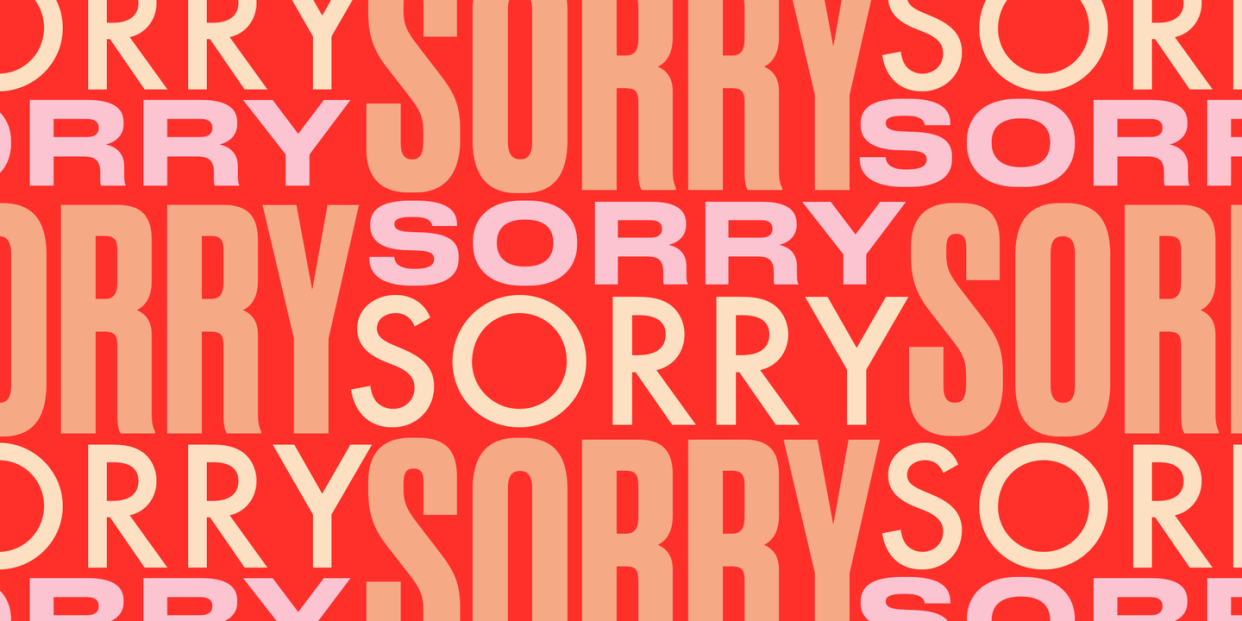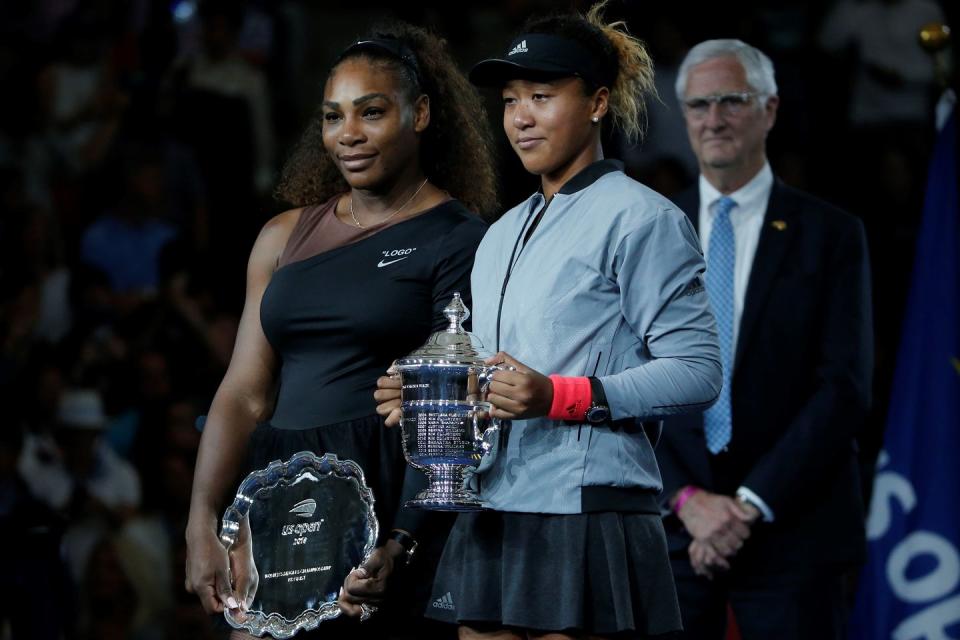You Owe Me an Apology

Serena Williams is the GOAT by all athletic standards. LeBron James has proclaimed it. Colin Kaepernick declared it. I'm very sure her daughter Olympia believes it. There is no modern athlete as awarded and credentialed as her, and if she never stepped foot on a court again, her status as the greatest of all time is, for many of us, set in stone, cast in gold, and permanently irrefutable.
This is why it was fascinating to watch as the validity of Williams' reaction to being accused of cheating by umpire Carlos Ramos during the Women's Final of this year's US Open was debated, and debated, and debated some more. Some self-proclaimed tennis aficionados have argued that Serena's reaction was nothing more than the display of a sore, entitled loser. Others-including several professional male tennis stars and Billie Jean King, the grand matron of women's tennis-have called out the sexist double standard in both the umpire's calls and the public response to Serena's words. And just when we thought the conversation had quieted, an Australian cartoonist resurrected the trend in uninspired, boringly racist fashion, depicting Serena as an oversized brute, and Naomi Osaka, the new and powerful US Open champion of Haitian and Japanese descent, as a blonde-haired white woman.
But I'm not here to relitigate the incident. Because the most striking lesson I derived from all of this was a profound life lesson: demand the apologies you deserve.
Williams uttered the phrase with clarity, without irony or apology. Her feet were firm and her voice was steady.
"You owe me an apology."

In that instant, it occurred to me that I have never spoken this phrase. To anyone. Not a lover, not a friend. Not a bad boss or a vindictive colleague. This is not for lack of opportunity. I'm a black woman in America. I have been owed plenty of apologies.
I just never believed I deserved to demand one.
In the instant that I watched Serena’s firm command, I anxiously searched my consciousness to determine why, in my 33 years of living, I had never demanded an apology I believed I was owed. I have certainly expressed personal and professional grievances; I have given voice to hurt feelings and frustrated moments with greater intention as I've grown in confidence-a confidence which is hard earned.
But the idea that someone would need to affirm responsibility for their actions and impact on me had just never occurred to me. I have quietly carried the scars of apologies desired but never received, seething with resentment but never questioning why I didn't demand an apology in the first place. I have always known, as seemingly all Black mothers say, that "closed mouths don't get fed," and that it is rare that anyone receives that which they do not ask for. Still, I had not formed my lips to utter the words: you owe me an apology.
The cycle of my socialization was centered on the archetype of the Strong Black Woman. I met her early and often. She was the long-suffering mother in films, and the sturdy women of my church. They held everything together-and I do mean everything-with little thanks, acknowledgment or applause. They suffered quietly and labored intensely. When they were wronged by men, they chalked it up. When they were abused by systems and institutions, they kept pushing. That’s a Black woman's life. Take a licking, keep on ticking, because if you don't, your family won't eat, the church won't run, and the school can't function. The weight of the world sits on our bosom, simply leaving no time to argue with the people who have harmed you. That’s a Black woman's life.
And if we ever did muster the audacity to push back, to demand, to respond? That did not come without punishment. As each of us are socialized, we develop survival mechanisms based on what we observe. When our proverbial hands get slapped, we learn to silence our instincts until that silence becomes habit.
I was an early and vocal leader at my predominately white, affluent, private Midwestern high school. I spoke up in class, made speeches in school-wide assembly, and co-founded our school's first diversity organization back in 1998, long before the concept died an unceremonious death from overuse.
Despite some people’s discomfort with the topics we broached, our club was highly regarded and well-attended. There was one student, however, whose privileged existence saw my work as an existential threat to his way of life and inflated ego. I ignored him for several weeks as he harassed me between classes, walking closely behind me and asking me if his "whiteness" or "maleness" was "offending" me today. One day, though, I had had enough. Standing in front of the girls’ locker room, I finally turned and confronted him.
Then? He spit at me.
I now know this to be the classic fragility of patriarchal white supremacy. Back then, I was stunned.
I turned and entered the locker room. As I sat on the hard bench and stared into an empty locker, I somehow instinctively knew this was the quiet plight I had to carry. It was the same spit I’d seen hurled at Elizabeth Eckford, one of the Little Rock Nine, as I watched her silently integrate Little Rock's Central High School in the documentaries my parents had us watch. It was the same spit Diane Nash felt as she sat at segregated lunch counters in Nashville, TN. My adolescent pursuits toward social awareness were undoubtedly humble and incredibly minor by comparison, but the hate for the audacity of black womanhood was the same.
After a week, I finally told someone-one of the two black teachers I had in my entire secondary experience. I told him only because I couldn't carry the emotional stain anymore, the shame that shouldn't have been mine to carry, but made me feel dirty all the same. But as I sat on his office couch, I knew the confession was futile. At just 15 years old, life had taught me enough for me to know nothing real would be done. The student who assaulted me was a rich white boy, the son of a trustee who was well-connected and well-respected. I was little black girl, a scholarship kid and the daughter of a hard-working widow. I knew how that story ended.
My prediction was correct. After my teacher made me tell our head of school, I received a forced, clenched-mouth apology-and further retribution from a student who was now even more angry. I never told anyone about the harassment that continued. I never asked for another apology.
On that day, I learned with abundant clarity that black girls don’t demand apologies. As a Black woman, speaking up about the needs of others would win me applause; speaking up for myself would earn me punishment. I'd be vilified for even thinking I deserve dignity, and as I try to pursue justice for the rest of the world, I simply don't have that kind of time. For black girls, demanding the apologies we deserve is usually just wasted energy in a world where we can't afford to waste anything.
I didn’t tell that story again until I was 29 years old. By then, I was working daily in the Ferguson Uprising, and my high school asked me to return to that same assembly hall that had once earned me abuse and discuss our protest, power and plan. Before my speech I called that same trusted teacher and confided I was at an uncharacteristic loss for words. "The words will come to you," he said. And that story is what came out.
Even as I write this, tears are welling in my eyes, a salty mix of shame that I don't deserve and grief of a trauma unhealed. Consider, for a moment, all the apologies the women in your life, on your teams and in your family have never requested but were owed. Consider all the times they were given apologies and responded, "it’s ok," even though it wasn't. Consider all the times they themselves apologized for asking for an apology. Consider that the umpire may be any one of us who have harmed someone socialized to believe they my stomach the harm they receive.
Women are socialized to prioritize the comfort of others over self, no matter how shameful or painful the moment. This responsibility increases for women of color, who are often the mules of a society determined to pin domestic and social labor on Black, Latinx, Asian and Indigenous women who suffer in silence for fear of punishment and degradation.
Serena's declaration was an instantaneous declaration of freedom. Freedom for every woman who deserves an apology from the boss who gave her a #MeToo story to tell. Liberation for every black woman who was spoken over by a white woman in the erroneous name of unity in feminism. Deliverance for every little girl who's been socialized to believe she must sacrifice her dignity for your comfort.
You owe us an apology. And thanks to Serena, I'm no longer ashamed to demand it.
Brittany Packnett is an activist, educator and writer living in Washington, DC. She is co-host of Pod Save The People and a Fall 2018 Resident Fellow at Harvard’s Institute of Politics, teaching a course on social change.
('You Might Also Like',)

